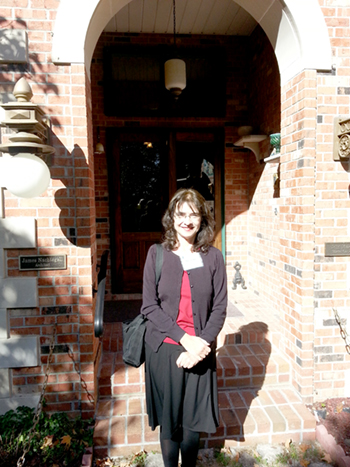
It’s hard to stand against the universal acclaim of the Beatles and Dissident Prof is glad to hear she shares the good company of WFB. The Beatles’ early songs were poor imitations of American rock ‘n roll. Like many in the 1960s, they thought they were inspiring the folk, with their songs that turned out to be sappy, insipid, and imitative.
She prefers the squares of the time who sang of what they knew: cheatin’ hearts and lonesomeness: Conway Twitty, Tammy Wynette, Charlie Price, Johnny Cash, Loretta Lynn, Ray Price, and Hank Williams. And not one word about world peace.
The Beatles appealed to rich white kids, who wanted to lead “the people” through a cultural shift. Many who had never had to work with their hands or leave the Upper East Side decided to study the history of the South, which for them never changed from the opinion the SDS and SNCC had when they decided they would awaken the blacks from their religious delusions and beat the ignorant white hayseeds and debutantes with charges of “white privilege.” Then these coddled youth got tenure or went to work for the New York Times and provided each other their deep thoughts about such issues as Trayvon Martin and Paula Deen.
Is it surprising that all the professors interviewed for the New York Times article, “Paula Deen’s Cook Tells of Slights, Steeped in History,” concurred that her behavior points to evidence of a South still mired in racism?
 When did reporters stop reporting the news? Kim Severson, instead of reporting on the facts of the case, has to impose on the reader the description of the relationship between Deen and former employee Dora Charles as “a complex one, laced with history and deep affection, whose roots can be traced to the antebellum South. . . . it illustrates lives of racial inequity or benevolence.”
When did reporters stop reporting the news? Kim Severson, instead of reporting on the facts of the case, has to impose on the reader the description of the relationship between Deen and former employee Dora Charles as “a complex one, laced with history and deep affection, whose roots can be traced to the antebellum South. . . . it illustrates lives of racial inequity or benevolence.”
To affirm her assessment, Severson turns to Jessica B. Harris, “a culinary scholar,” who said that Deen and Charles are “characters in a story that has been played out since slaves started cooking for whites.”
Hodding Carter III, public policy professor at the University of North Carolina at Chapel Hill, affirms Severson’s assessment that the “power imbalances on race” have a particular “historical resonance” in the South.
Marcie Ferris, “a professor who coordinates the Southern studies program at the University of North Carolina at Chapel Hill,” concurs, “’It points to the fact that race is at the heart of Southern food and you can’t avoid it.’”
Really? Have any of these people been to an expensive restaurant in Atlanta recently? Have they seen who is dining and who is serving? Have they seen who is working in the kitchen? Have they, for that matter, ever had to work in a restaurant themselves?
Continuing the theme of Southern racism and “white rage” is University of Buffalo (SUNY) history professor Carole Emberton, who uses the Trayvon Martin case to weigh in with the theme of her book, Beyond Redemption: Race, Violence, and the American South after the Civil War at the History News Network. She begins by disputing the claim of pundits that “fear is at the heart of the matter” in the case of “the murder of Trayvon Martin.” The emotion with greater “historical valence” is “rage.” As evidence, she points to George Zimmerman’s use of profanity to describe what he thought was another burglar in his neighborhood. Imagine! Being angry about break-ins in your neighborhood! Such rage or anger at people breaking into houses, in the professor’s estimation, is evidence of racism on the same order as lynchings during Reconstruction (as the photo accompanying the article indicates). She ends her analysis by comparison with the 1867 example of Peter Marang, a black man who was falsely accused of stealing two barrels of turpentine by Ely Faulk, a white man. He was shot in the back by Faulk, who then skipped town and did not need to face “justice for his actions.” The historian leaves readers with this: “Faulk did not need a law codifying his right to ‘stand his ground’ when confronted by an inferior being; it was inherent in the culture of the post-war South. When I think of what it means to be afraid, I think of Peter Marang. . . and Trayvon Martin.”
If this analysis of “white rage” enrages you then you must be a racist, according to these historians.
In the historians estimations, the “legacy” of racism in the South means that anyone who hires a black person for less than what the boss is making, that anyone who does not vote Democrat, that anyone who does not believe that a less-qualified person should get the scholarship or job that you don’t need, that anyone who thinks that sometimes when a “white Hispanic” kills a black person it might be in self-defense, is a racist.
If you don’t know that you’re a racist, please ask a historian.
And of course if you are a College Republican who doesn’t support our first-ever white-black president it must mean you are a racist…or at least a “security threat,” and that’s why you can’t enter an event at the University of Central Missouri, where the president is speaking--even though you got tickets and paid your tuition and fees. The t-shirts emblazoned with tea party slogans, Republican symbols, and patriotic motifs, apparently, scared security. Right.
Furthermore, if you write a headline that is "rude" to the president, insinuations will come your way from Jim Galloway and you will be fired. And always remember what happened to Paula Deen (and remember that she supported Barack Obama) and remember Trotsky.
 Speaking of Trotsky, don’t try to keep Marxist propaganda by Howard Zinn out of teachers colleges as Mitch Daniels tried to do while governor of Indiana. After much commentary about “censorship” and puffing about Daniels’ lack of academic credentials, the professors of the American Historical Association sent an open letter. Even leftist critics of Zinn’s history turned to defend Zinn and denounce Daniels for stepping out of line.
Speaking of Trotsky, don’t try to keep Marxist propaganda by Howard Zinn out of teachers colleges as Mitch Daniels tried to do while governor of Indiana. After much commentary about “censorship” and puffing about Daniels’ lack of academic credentials, the professors of the American Historical Association sent an open letter. Even leftist critics of Zinn’s history turned to defend Zinn and denounce Daniels for stepping out of line.
Exiled is Book-of-the-Month in Phyllis Schlafly’s Education Reporter. The book offers first-hand accounts of how the cabal of radical professors keep out those who dare question their views. Dissident Prof is proud of the mention.
History departments are full of people who cannot think beyond stereotypes and clichés and provide quotes for the equally vapid New York Times reporter to puff out the piece that begins with a false premise.
All the cant about admitting women and minorities was a ruse, for only the women and minorities whose thinking runs along the tracks of the radicals are allowed in.
The radicals are bent on destroying philosophy departments, which, like science and math departments, attract more men than women. So Georgia State University has imposed a quota, mandating that all instructors increase the number of female philosophers on the syllabus to at least 20 percent, as Inside Higher Ed reports. So how to appeal to those who are not drawn to philosophy? Change philosophy! What will happen is that philosophy departments will turn into women’s studies departments, with the subject matter trivialized. Dissident Prof saw it happen in an English department when to fulfill quotas, a professor added a popular female novelist of the nineteenth century to the syllabus. She remembers a class discussion that ensued about umbrellas and dresses.
She also remembers delightful afternoons at the University of Georgia in philosophy seminars, where she joined about twenty men and one other woman in discussions about the dialogues of Socrates that went well over class time.
This is a plot to change and destroy philosophy, long an object of feminists’ ire. Socrates will be replaced by Martha Nussbaum, and even worse.
I don’t think Plato would approve. Nor would he approve of the Beatles. My marketing director will not approve because after alienating rap music fans at the forum at Kennesaw State University in April, I’ve now managed to probably alienate Beatles’ fans, approximately 95 percent of the world population, alas.





